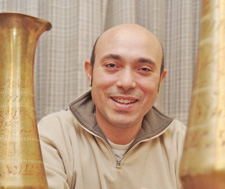Unveiling diversity in Arab community

Cultures of the Arab world are not monolithic, says professor Walid El-Khachab.
Photo by Kate Hutchinson
Breaking away from clichés is the key to understanding Arab cultures, according to professor Walid El-Khachab.
Looking at the Arab world as a single entity is one of the most common misrepresentations that needs to be challenged, he said in an interview.
El-Khachab starts from this premise to teach language and culture in the Arabic program, part of the Department of Classics, Modern Languages and Linguistics.
“Concordia is the ideal setting to teach Arab cultures and create bridges with the Western world,” he said.
Since it was launched in September 2004, the program has attracted students with no previous exposure to Arab cultures as well as some from the university’s large Middle Eastern community.
While language classes are restricted to those who are working towards a minor in Modern Arabic, literature courses are open to everyone, and allow for a greater exchange.
Next semester, El-Khachab will be teaching a course on Love and Sexuality in Arabic Literature that will cover several controversial topics, such as women’s desire, homosexuality and the love for the divine.
The Egyptian-born professor will address one of these topics later this week during the sixth annual Festival du Monde Arabe.
He will introduce a panel discussion titled “Et si l’on parlait désir?” that will examine the issue of desire in the Arab world from a multidisciplinary perspective, with contributions from psychoanalysts as well as literary scholars.
“Desire is in fact not merely a sexual issue, but it is also has political connotations,” he said.
The hijab – the veil that Muslim women traditionally wear over their heads, but that now has become a highly eroticized cultural artifact – is an example of how desire results from a combination of political and social elements.
Festival theme: women
This year’s edition of the Festival du Monde Arabe is dedicated to women. By looking at the symbolic impact of the harem, the festival aims to break stereotypes through discussions, films and live shows.
“There are many cultural and ideological affinities between the festival and Concordia’s Arabic program,” El-Khachab said.
Concordia is a partner of the festival for the second year in a row and will hold a discussion today, Nov. 10, at 6 p.m., titled “Femmes d’Orient, femmes d’Occident, mythes et réalités”.
El-Khachab moved to Montreal for a PhD in comparative literature, which he completed in 2003 at the Université de Montréal.
An expert in Arabic cinema, he is a founding member of the Association le Tiers, an organization that promotes cinema from the Third World.
Le Tiers will screen the 1997 Egyptian film Le Destin by Youssef Chahine at 6:30 p.m. on Friday Nov. 18 in Room H-1013 of the Hall Building. The screening will be followed by a discussion moderated by El-Khachab and May Telmissany, another teacher of the Arabic program and president of Le Tiers.
“Et si l’on parlait désir?” takes place at 6 p.m. on Nov. 12 in the Auditorium of the Grande Bibliothèque, 475, de Maison-neuve Blvd. E. For more information please visit www.festivalarabe.com
